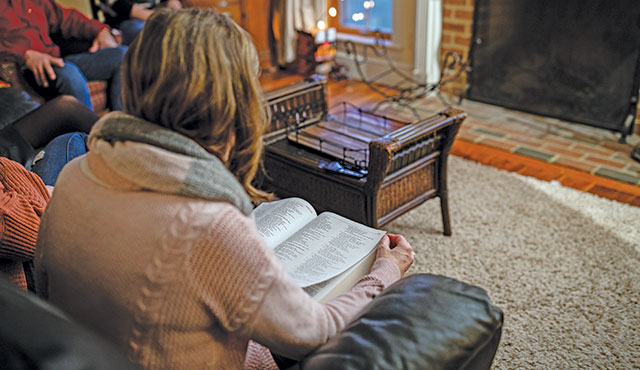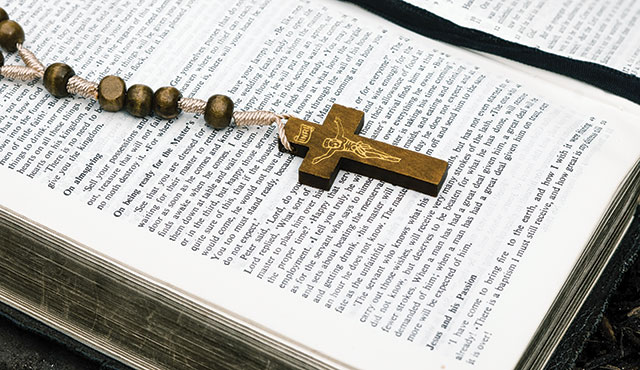When Pope Francis established the annual celebration called Sunday of the Word of God, it was no accident that he chose Sept. 30, 2019—the Feast Day of Saint Jerome and day of the saint’s death 1,600 years ago—to make the announcement in his Apostolic Letter or Aperuit Illis.
“Ignorance of the Scriptures is ignorance of Christ,” Saint Jerome once said, and this was the essence of Pope Francis’s call to Catholics around the world to bring Scripture into daily life, and he described specific ways to do this.
The Sunday of the Word of God is to be celebrated the third Sunday in Ordinary Time—which fell on Jan. 24 this year. It is to be “a Sunday given over entirely to the Word of God,” Pope Francis wrote in his Apostolic Letter, “so as to appreciate the inexhaustible riches contained in that constant dialogue between the Lord and his people.”
The liturgy of that day speaks directly to “the place of the Bible in our lives as Catholics, explains Reverend Alfred Baca, director of the Office for Evangelization and Faith Formation in the Diocese of Orange—and that “place” has spiritual and physical meaning.
The Bible is the spiritual center of Catholic faith. Some pastors invite parishioners to hold the Bible against their hearts for a prayer and blessing during the Sunday of the Word of God Mass. “This to me is powerful,” says Father Baca. “It should not be the only time I hold the Bible over my heart and it should lead me over and over again to love and want to search for the Lord in the Word of God. When I find God, I will find myself.”
Physically, the Bible can be “enthroned” in the home, prominently positioned along with a crucifix, icon or flowers, where everyone in the family can see it and read Scripture frequently or even daily.
In his Apostolic Letter, Pope Francis encourages the daily practice of lectio divina, reading a Gospel passage slowly, first out loud and silently, and then contemplating the words for their spiritual meaning. This deepens connection and appreciation of the Bible.
“For daily Bible reading, I recommend ten or fifteen minutes a day,” says the Very Reverend Christopher Smith, rector and episcopal vicar of Christ Cathedral. “I think it is best to start with the Gospel of Mark, since it is the shortest. It only takes a few minutes to read one or two chapters at a time,” he explains. “Begin with the Sign of the Cross, take a moment of silence, read the passage, take another moment of silence and ask the question, ‘Lord, what would you have me hear through this passage?’ followed by a moment of silence. Then reread the passage.”
This practice doesn’t need to be time consuming. “The most important part about making Scripture a part of every day is to plan the small chunk of time, as one would plan time for a meal or a walk,” says Father Smith. “If the daily time is honored several days in a row, the time with the Scriptures will become a way of life that is as important as any other daily activity.”
As just as regular exercise can improve the body, regular reading of the Bible can improve the spirit. “We should never take God’s word for granted, but instead let ourselves be nourished by it, in order to acknowledge and live fully our relationship with him and with our brothers and sisters,” wrote Pope Francis.
Another benefit: Reading Scripture regularly reminds individuals that they belong to the wider Catholic community. “The relationship between the Risen Lord, the community of believers and sacred Scripture is essential to our identity as Christians,” Pope Francis wrote. “To listen to sacred Scripture and then to practice mercy: this is the great challenge before us in life. God’s word has the power to open our eyes and to enable us to renounce a stifling and barren individualism and instead to embark on a new path of sharing and solidarity.”
If there was ever a time when people need to be united spiritually it is now, in the midst of the worldwide Covid pandemic which has forced so many into extended isolation. “In good times and bad, the Word of God guides us,” says Father Baca. “Right now, in the midst of the pandemic,
the Scripture can comfort and console us. I often pray Psalm 91 and it gives me strength. Like many, I have lost family and friends to Covid. To comfort others and myself I go to the Scripture and I put my trust in the Lord who reminds me that He is the way, the truth, and the life. With Him there is nothing to fear, not even death.”


